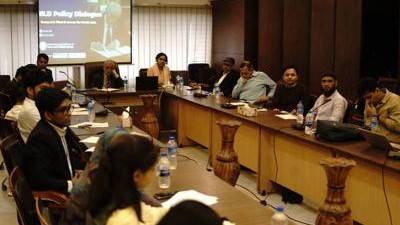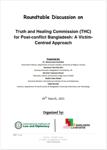
Dhaka, Bangladesh — The recent IILD Policy Dialogue on the evolving U.S. political landscape under Trump 2.0 provided a comprehensive analysis of the potential implications for South Asia, with a particular focus on Bangladesh. Experts from various fields discussed how the Trump administration’s policies might reshape the region’s geopolitical and economic dynamics. Key recommendations emerged on how Bangladesh can strategically navigate these changes to bolster its national interests.
Geopolitical Dynamics and Bangladesh’s Diplomatic Strategy
Ataur Rahman Opurba, Assistant Professor at BUP IR and Fellow of IILD, opened the discussion by analyzing the shifting geopolitical landscape in light of the U.S. election outcomes. He highlighted that a hardline U.S. stance on China, especially in relation to Taiwan, is expected to continue under Trump, with India’s role in the region remaining crucial. However, this could present challenges for Bangladesh, as its traditional ties with both the U.S. and China may be strained.
Recommendations from Opurba emphasized that Bangladesh should focus on strengthening diplomatic ties with both the Republican and Democratic factions in the U.S. Furthermore, he urged the country to balance its relationships with China and the U.S., avoiding over-reliance on either superpower.
Defense and Security: Navigating Changing Tides
Speakers noted that under Trump’s policies, U.S.-India defense partnerships are likely to deepen, with advanced weapon systems and defense deals on the horizon. Opurba pointed out that Bangladesh should continue its involvement in military training programs, such as IMET, and explore more cost-effective defense procurement options. However, challenges persist regarding compatibility with U.S. weapon systems due to Bangladesh’s reliance on Chinese military hardware.
In response, Saquib Ali, a former diplomat, advocated for Bangladesh to utilize its domestic resources to gain leverage, particularly in emerging industries like semiconductors. Bangladesh’s silica reserves, notably from rice husks, could position the country as a key player in the global semiconductor market, thus enhancing its bargaining power in international negotiations.
Economic Impact of Trump’s Protectionist Policies
The protectionist policies of the Trump administration were discussed in detail by Dr. Mizanur Rahman, Professor at the University of Dhaka, who highlighted the potential economic fallout from increased tariffs on imports. Bangladesh’s RMG (Ready-Made Garments) sector, a major export industry, is particularly vulnerable to these tariffs. Rahman stressed the importance of negotiating favorable tariff conditions with the U.S. and exploring alternative trade routes to mitigate losses.
Diversification of the export sector was also a key point raised. Bangladesh should look to expand beyond RMG into high-growth sectors such as ICT, pharmaceuticals, and agro-products. Furthermore, positioning itself as a relocation hub for industries moving away from China could attract significant foreign direct investment (FDI).
Human Capital Development: A Path to Economic Independence
Joynul Islam, Technical Assistant at the World Health Organization, called for a shift away from reliance on foreign aid and towards long-term sustainable policies. He emphasized the importance of developing a skilled workforce, transforming Bangladesh’s low-skilled labor force into valuable human capital. This would ensure that Bangladesh can sustain its economic growth without becoming overly dependent on external assistance.
Climate Policy and Sustainability
In light of potential cuts to U.S. climate adaptation funds, Opurba cautioned that Bangladesh’s green energy transition could face challenges. He urged the country to focus on strengthening climate diplomacy and seek alternative funding sources to support its environmental goals.
Key Recommendations for Bangladesh
The policy dialogue concluded with a set of key recommendations for Bangladesh to navigate the uncertainties brought about by Trump’s administration:
- Strengthen diplomatic ties with both Republicans and Democrats in the U.S.
- Maintain a balanced relationship between China and the U.S. to avoid overreliance on either.
- Diversify export sectors beyond RMG, including ICT, pharmaceuticals, and agro-products.
- Capitalize on Bangladesh’s resources, such as silica reserves, for semiconductor production.
- Develop a skilled workforce to reduce dependence on foreign aid and enhance domestic growth.
- Monitor U.S.-India defense partnerships and adjust Bangladesh’s defense strategy accordingly.
- Leverage emerging market ties in Africa and East Asia for economic and diplomatic opportunities.
- Strengthen climate diplomacy to compensate for expected cuts in U.S. funding for climate adaptation.
By implementing these strategies, experts believe Bangladesh can safeguard its interests and adapt to a rapidly changing global order driven by unpredictable leadership in the United States.
Conclusion
As the geopolitical and economic landscape continues to evolve under the Trump administration, Bangladesh faces both significant challenges and new opportunities. With proactive diplomatic engagement, economic diversification, and strategic resource utilization, Bangladesh can position itself as a resilient player in the shifting global order.





Leave a reply